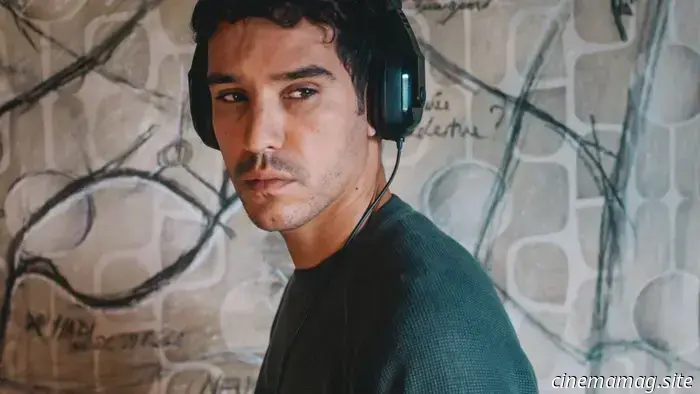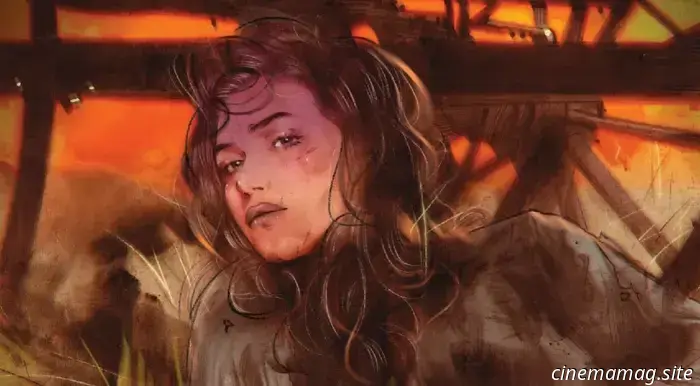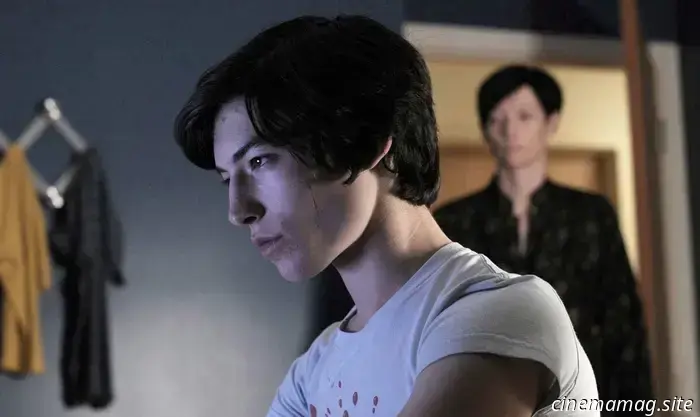
Ghost Trail Review: A Gripping Surveillance Thriller Shadowed by the Syrian Conflict
Note: This review was first published as part of our coverage for the 2024 Cannes Film Festival. Ghost Trail is set to be released in theaters on May 30.
The conflicts in Gaza and Ukraine have captured media attention in recent years, yet the Syrian civil war, ignited by the 2011 Arab Spring, has received relatively scant coverage today. This war is still ongoing and has resulted in a precarious stalemate. Over a decade of fighting has led to horrific humanitarian crises and wartime atrocities, displacing 13 million Syrians from their homes. These refugees, scattered across foreign countries seeking asylum, continue to search for answers and potentially for justice. Director Jonathan Millet’s debut narrative feature, Ghost Trail, delves deeply into the mind of one survivor, exposing the toll of a conflict that the world appears to have moved beyond.
In Strasbourg, France, Hamid (Adam Bessa), a mild-mannered asylum seeker, is doing odd jobs within Syrian exile circles while searching for a man he claims is his cousin, who went missing during the war. He occasionally rents an office suite to speak with his elderly mother via Zoom; she resides in a Lebanese refugee camp while he pretends to be successfully working in Berlin. Millet gradually reveals that Hamid is actually part of a clandestine organization in Europe that hunts down Syrian war criminals who have disguised themselves and vanished into European society. The target of Hamid's pursuit is Harfaz, a particularly infamous war criminal and Hamid’s own torturer from his illegal imprisonment in Syria.
Hamid persistently seeks out Harfaz but only has a blurry photo to guide him. He was hooded during his torture sessions, meaning neither the torturer nor the tortured can recognize each other. However, Hamid recalls Harfaz's voice, the scent of his breath, the sound of his footsteps, and the force of his blows. Millet wisely opts against using flashbacks to depict the torture, avoiding gratuitous violence. Instead, these episodes are conveyed through Hamid's testimony, which is far more harrowing and impactful. Keeping the torture off-screen maintains the identity of Harfaz and sustains tension.
Hamid's spy group is tracking a man in Germany whom they believe to be Harfaz; however, Hamid fixates on Hasaan (Tawfeek Barhom) as his main suspect. He watches despairingly as Hasaan, whom he suspects is his torturer, leads a life that has been denied to him—dressing sharply, staying fit, attending university, and even dating a French woman. In contrast, Hamid endures a shattered body and debilitating PTSD, while also mourning his wife and daughter, who were murdered. Millet emphasizes that these citizen spies, inspired by real individuals, are not trained operatives; they are ordinary people—lawyers and teachers—dedicating their lives to seeking justice. While this is heroic and noble, it is also profoundly isolating, compounding the traumas they are trying to escape.
This isolation is particularly evident in Hamid, whose overwhelming secrecy and uncertainty lead him to reject the romantic advances of Yara (Hala Rajab), a fellow Syrian exile who wants to support him emotionally and desires intimacy. The depth of the loss caused by the Syrian war is also represented by Nina (Julia Franz Richter), a German woman in Hamid's group, who seeks vengeance for her murdered Syrian husband. In confronting the unspeakable crimes of war criminals and the bleak prospects for trials and convictions, Millet prompts us to examine the ethics of extrajudicial killings as a possible, albeit troubling, means of closure for survivors.
Bessa immerses himself in the character of the figuratively and literally tormented Hamid, delivering a compelling portrayal of wounded masculinity and a constrained spirit. In the rare moments when he is shown in close-up, his haunted, piercing gaze conveys a wealth of emotion. Barhom is particularly charismatic, with a prolonged dialogue scene near the end providing a platform to showcase his considerable screen presence. Both actors lend significant gravitas to the film. Barhom starred in Tarik Saleh’s Boy From Heaven/Cairo Conspiracy, which won an award at Cannes two years ago; Bessa received the Best Actor award in Un Certain Regard in 2022 for Lotfy Nathan’s Harka and is also part of Netflix’s Extraction series.
Millet's documentary background benefits his directorial debut, bringing a sense of realism to the contemporary settings in France and the refugee camps in Lebanon. The scenes depicting covert surveillance and photographing of suspects appear almost effortlessly executed, even if modern society has made surveillance relatively simple. The typical pitfalls of a debut film are mostly absent, although some dialogue during the spy-cell meetings, conducted via Twitch-like streams of first-person shooter games, feels somewhat overly expository. A prologue set in Syria, occurring two years prior to the main narrative, might have been better omitted.
Ghost Trail leaves a powerful and lasting impression
Other articles
 The Damn Tragedy - Comic Book Review
Andrew Newton evaluates Oni Press’ latest one-shot comic, The Goddamn Tragedy... The Goddamn Tragedy from Oni Press delivers precisely what its title suggests: a slowly unfolding, grief-laden Western that remains in one’s thoughts well beyond the final page. Chris Condon, recognized for That Texas Blood, introduces a unique form of darkness in this narrative, replacing the sun-baked […]
The Damn Tragedy - Comic Book Review
Andrew Newton evaluates Oni Press’ latest one-shot comic, The Goddamn Tragedy... The Goddamn Tragedy from Oni Press delivers precisely what its title suggests: a slowly unfolding, grief-laden Western that remains in one’s thoughts well beyond the final page. Chris Condon, recognized for That Texas Blood, introduces a unique form of darkness in this narrative, replacing the sun-baked […]
-Movie-Review.jpg) Tornado (2025) - Film Review
Tornado, 2025. Directed and penned by John Maclean. Featuring performances by Kōki, Tim Roth, Jack Lowden, Takehiro Hira, Rory McCann, Ian Hanmore, Jamie Michie, Jack Morris, Sammy Hayman, Nathan Malone, Dennis Okwera, Raphaël Thiéry, Joanne Whalley, Alex Macqueen, Douglas Russell, and Bryan Michael Mills. SYNOPSIS: The daughter of a Japanese puppeteer becomes entangled with criminals during their performance […]
Tornado (2025) - Film Review
Tornado, 2025. Directed and penned by John Maclean. Featuring performances by Kōki, Tim Roth, Jack Lowden, Takehiro Hira, Rory McCann, Ian Hanmore, Jamie Michie, Jack Morris, Sammy Hayman, Nathan Malone, Dennis Okwera, Raphaël Thiéry, Joanne Whalley, Alex Macqueen, Douglas Russell, and Bryan Michael Mills. SYNOPSIS: The daughter of a Japanese puppeteer becomes entangled with criminals during their performance […]
 The 15 Greatest SNL Characters in 50 Years of Saturday Night Live
The 15 Greatest SNL Characters in 50 Years of Saturday Night Live
-Movie-Review.jpg) The Thicket (2024) - Film Review
The Thicket, 2024. Directed by Elliott Lester. Featuring Peter Dinklage, Juliette Lewis, Levon Hawke, Leslie Grace, Gbenga Akinnagbe, Esme Creed-Miles, Andrew Schulz, Macon Blair, Arliss Howard, James Hetfield, Ryan Robbins, Ned Dennehy, David Midthunder, Sophia Fabris, Guy Sprung, Derek Gilroy, Chris Enright, and Teach Grant. SUMMARY: Set in West Texas. A young boy embarks on a quest after his sister is […]
The Thicket (2024) - Film Review
The Thicket, 2024. Directed by Elliott Lester. Featuring Peter Dinklage, Juliette Lewis, Levon Hawke, Leslie Grace, Gbenga Akinnagbe, Esme Creed-Miles, Andrew Schulz, Macon Blair, Arliss Howard, James Hetfield, Ryan Robbins, Ned Dennehy, David Midthunder, Sophia Fabris, Guy Sprung, Derek Gilroy, Chris Enright, and Teach Grant. SUMMARY: Set in West Texas. A young boy embarks on a quest after his sister is […]
 Ezra Miller is set to collaborate again with director Lynne Ramsay for a vampire film.
Fresh from the debut of her latest film, Die, My Love, featuring Jennifer Lawrence and Robert Pattinson, at the Cannes Film Festival, esteemed director Lynne Ramsay has been discussing her upcoming projects with the Los Angeles Times. The filmmaker has disclosed that she is considering a collaboration with Ezra Miller, her star from We Need to Talk About Kevin.
Ezra Miller is set to collaborate again with director Lynne Ramsay for a vampire film.
Fresh from the debut of her latest film, Die, My Love, featuring Jennifer Lawrence and Robert Pattinson, at the Cannes Film Festival, esteemed director Lynne Ramsay has been discussing her upcoming projects with the Los Angeles Times. The filmmaker has disclosed that she is considering a collaboration with Ezra Miller, her star from We Need to Talk About Kevin.
 In Support of Disney's Live-Action Lilo & Stitch
EJ Moreno presents a video explaining the success of the Lilo & Stitch remake. Director Dean Fleischer Camp faced a more difficult challenge in adapting Lilo & Stitch than I had previously realized. It wasn't just the daunting task of translating the vibrant visuals and entertaining characters, but it also came to light that the film had such a devoted […]
In Support of Disney's Live-Action Lilo & Stitch
EJ Moreno presents a video explaining the success of the Lilo & Stitch remake. Director Dean Fleischer Camp faced a more difficult challenge in adapting Lilo & Stitch than I had previously realized. It wasn't just the daunting task of translating the vibrant visuals and entertaining characters, but it also came to light that the film had such a devoted […]
Ghost Trail Review: A Gripping Surveillance Thriller Shadowed by the Syrian Conflict
Note: This review was initially published as part of our coverage of Cannes 2024. Ghost Trail will be released in theaters on May 30. The conflicts in Gaza and Ukraine have been prominent in the news for the last few years; however, the Syrian civil war, which began after the Arab Spring of 2011, has received comparably less attention lately.
